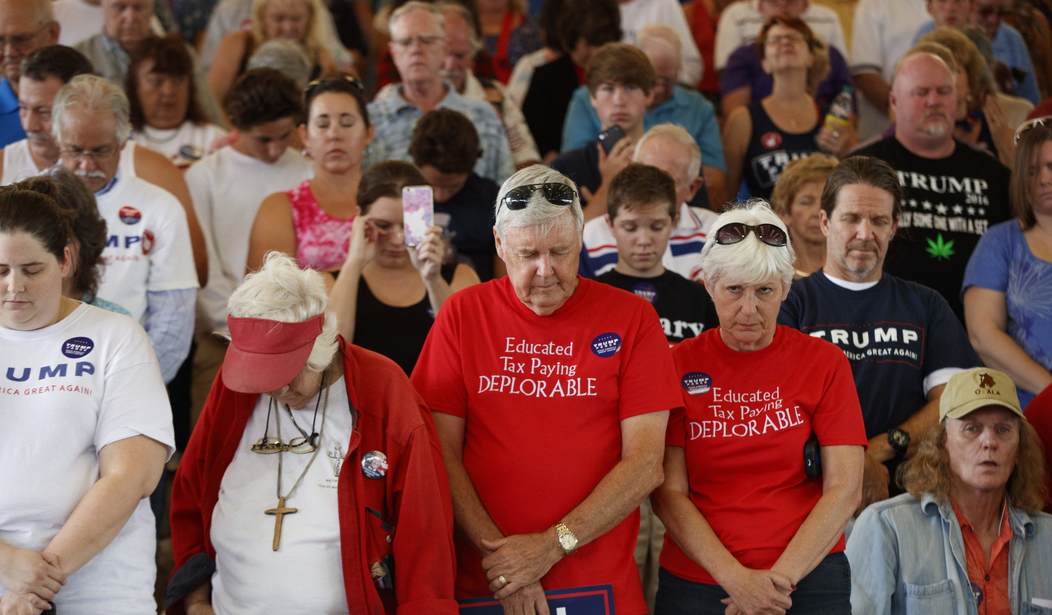The final Republican presidential debate of 2015 revealed the contours of true crossroads for the GOP. There are three very distinct and viable visions of what the party should become, encapsulated in the three leading candidates: media tycoon Donald Trump, Texas Senator Ted Cruz, and Florida Senator Marco Rubio.
Each candidate presents a distinct vision of a Republican party for 2016, and the contest between these three enables caucus-goers and primary voters to choose what the GOP should become.
Donald Trump – “Fortress America” and White Identity Politics
Multimillionaire Donald J. Trump has played the media like a campaign harp, using harsh — and occasionally downright stupid — rhetoric to dominate the airwaves. With no experience in elected office and a record of donating to liberal candidates and supporting liberal causes like single payer healthcare, Trump seems an odd choice for Republicans to support. As polls have shown, however, his support is very real — and it comes from his unique blend of liberal domestic politics and arch conservative foreign policy.
Trump’s political philosophy is a hodge-podge, but it centers on his suggestion for what could be termed a “Fortress America.” The media mogul would halt illegal immigration by building a wall on the southern border (and making Mexico pay for it!), while deporting the illegal immigrants already in the United States. While to many in the Democratic Party, this sounds anti-Hispanic, vast numbers of legal immigrants who feel cheated by an arcane system may warm to the idea.
On foreign policy, Trump would pull troops back, but he would emphatically reject Obama’s “lead from behind” mentality. Discussing military interventions in Iraq, Libya, and Syria, Trump declared that “we’ve done a tremendous disservice to humanity. The people that have been killed, the people that have been wiped away, and for what? It’s not like we had victory.”
Trump is a leading voice for a “Jacksonian” foreign policy — focused on victory over America’s enemies rather than spreading democracy to other nations. The media mogul will not allow anything to hold him back from pursuing an American victory over the Islamic State (also known as ISIS or ISIL). In the recent debate, he defended his promise to kill the innocent family members of terrorists.
The reluctance to get involved overseas, coupled with the ultimate use of force to defeat America’s enemies, follows in a long line of “Jacksonian” presidents. As Stephen K. Bannon and Alexander Marlow argued, Harry S. Truman’s constant bombing raids on Japan illustrated this “warrior tradition.” In addition to the use of atomic bombs on Hiroshima and Nagasaki, American forces bombed the enemy country to bits.
“The Jacksonians weren’t the least bit apologetic; in their tough martial worldview, the Japanese needed killin’, and that was all there was to it,” Bannon and Marlow explained. When Trump talks about killing terrorists’ family members or Ted Cruz talks about seeing “if sand can glow in the dark,” they are channeling this tradition — hesitant to go to war, but merciless in the pursuit of victory.
Alongside this tough foreign policy and anti-immigration “Fortress America,” however, Trump arguably presents a more moderate — or even liberal — domestic policy. The media mogul is no religious conservative, loves eminent domain, and has praised single payer healthcare. Trump has even argued against any kind or restructuring or reform for bloated mandates like Social Security, Medicare, and Medicaid — a surprisingly liberal position for a GOP frontrunner.
Soft-liberal domestic policy with a “Fortress America” hard-right foreign policy gives Trump a unique position in Republican politics. Some have speculated that the billionaire businessman is playing “white identity politics“ by advocating positions to protect a shrinking white majority against black and brown immigrants — Trump does seem to appeal to blue-collar workers more than typical GOP types.
Ted Cruz – Jacksonian, Classic Conservative
Texas Senator Ted Cruz offers Trump’s most distinctive position — tough on immigration and Jacksonian on foreign policy — but with a classical conservative domestic policy, and a bit less of a heated exterior.
Cruz proposes a hardline stance on immigration with more finesse and a much more concrete record than Trump. While Trump has famously alleged that Mexico sends the U.S. its criminals, Cruz has merely focused on addressing illegal immigration. Trump says he would force Mexico to pay for a wall on the southern border — Cruz joked that he’ll make Trump pay for the wall.
When the Senate passed the Rubio-Schumer “Gang of Eight” immigration reform bill in 2013, Cruz proposed and voted for numerous amendments to make it more conservative. While Rubio has recently claimed “there isn’t that big a difference between [Cruz] and I on how to approach immigration,” the record clearly disproves him. Rubio voted against each of the amendments Cruz voted for, and while Cruz still opposes a path to citizenship for illegals, Rubio still supports it.
In the final debate of 2015, Cruz declared that “we need to focus on American interests, not global aspirations.” On this front, he also has a more nuanced position than Trump. In May, Cruz said the Iraq war was “of course” a mistake, and he has criticized Obama, Hillary Clinton, and Rubio for supporting regime change in Libya, Egypt, and Syria.
As The Federalist’s Ben Domenech argued, Cruz “seems to believe the Bush years taught us that the public is neither pro- or anti-interventionist, nor are they pro- or anti-democracy agenda — they are mostly just for winning, by which they mean destroying our enemies.” Along these lines, Cruz supports the full use of force to destroy ISIS.
In an interesting twist, however, Cruz also supports civil liberties, and voted for the USA Freedom Act, which severely limited the NSA collection of bulk personal data. Cruz argues that this bill allows the government to target terrorists more effectively, while also preserving Americans’ civil liberties.
Cruz’s domestic policy — from civil liberties to his outspoken attacks on Obamacare, Planned Parenthood, and Washington corruption — echoes a classical liberal, even libertarian bent. This is one reason Cruz has taken much of the support from his fellow senator, Rand Paul. Cruz supports free markets, limited government, and classical Republican reform of the welfare state — from Medicare and Medicaid to the Department of Education and the Internal Revenue Service.
This blend of Jacksonian foreign policy and conservative economics — from a senator with a strong voting record — explains Cruz’s growing appeal and his rising poll numbers in the conservative-leaning state of Iowa.
Marco Rubio – Interventionist Soft Conservative
Florida Senator Marco Rubio supports a very different foreign policy vision than Cruz or Trump, and falls between them on domestic policy. In many ways, he is emerging as a compromise candidate — a “compassionate conservative” hawk who most resembles former President George W. Bush.
In the last debate of 2015, Cruz hit the nail on the head when he called Rubio a “Woodrow Wilson democracy promoter.” The Florida senator supported Barack Obama and Hillary Clinton with the disastrous intervention in Libya — overthrowing Gadhafi and opening the floodgates for terrorist expansion. He also supported arming the “moderate rebels” in Syria — arms that arguably ended up in the hands of the Islamic State.
Recently, Rubio has taken to calling Ted Cruz — a man who wants to bomb the Islamic State and see “if sand can glow in the dark” — an isolationist. Rubio defends his remark by explaining Cruz’s position on the USA Freedom Act. “We are now at a time when we need more tools, not less tools, and that tool we lost, the metadata program, was a valuable tool that we no longer have at our disposal,” Rubio declared.
Perhaps Rubio went on the offensive because Cruz has a much firmer record on immigration. In an election year that has seen the rise of Donald Trump, Rubio’s support for the “Gang of Eight” bill in 2013 could prove a big liability.
While Cruz has adopted nuanced responses to the critiques of former President George W. Bush, Rubio has hired Bush’s former advisors. Indeed, his foreign policy advisors read like a “who’s who” of prominent neoconservatives. His campaign slogan — “A New American Century” — can be taken as a throwback to the neocon Project for the New American Century (PNAC), which played a decisive role in pushing America into the Iraq War.
When it comes to domestic policy, Rubio has embraced the ideas of the “Reformicon” movement — a hodge-podge of conservative thinkers who arguably follow the Bush tactic in using government to prop up Republican voter blocs, rather than cutting the size and scope of government. This “conservative-lite” smacks of “compassionate conservatism” — an attempt to make conservative economics more acceptable to moderates, which may end up weakening the principles of free markets and limited government.
The Vital Decision
Next year, Republicans will decide if they want a president more like George W. Bush (Marco Rubio) or new versions of conservatism, combining a bold Jacksonian foreign policy with traditional conservatism (Ted Cruz) or with a moderate, or even liberal, economic policy (Donald Trump).
While no state has voted yet, the contours of the primary race have already begun to take shape. Cruz leads in the early state of Iowa, while Trump leads in New Hampshire and South Carolina. Cruz has engaged in traditional retail politics — holding town hall gatherings and ramping up staff across multiple states. Trump has played the media perfectly, arguably creating a bubble of support which may push him to the nomination. Rubio is aiming for a national media strategy, hoping it will boost him in the later — and more moderate — states.
As Ross Douthat wrote in the New York Times, “Rubio aspires to be Reagan (with a dash of Bill Clinton-in-1992 thrown in) but risks being another Dubya,” while “Cruz aspires to be Reagan (with a dash of the elder Bush and Richard Nixon) but might be Barry Goldwater in 1964,” and “Trump aspires to be no one but himself, a mash-up of Ross Perot, Pat Buchanan, Silvio Berlusconi and Jean-Marie Le Pen.”
Whatever happens, each candidate has gathered a movement to support his ideas. Next year will determine what sort of party Republicans want — and perhaps what sort of America will lead in 2017.








Join the conversation as a VIP Member